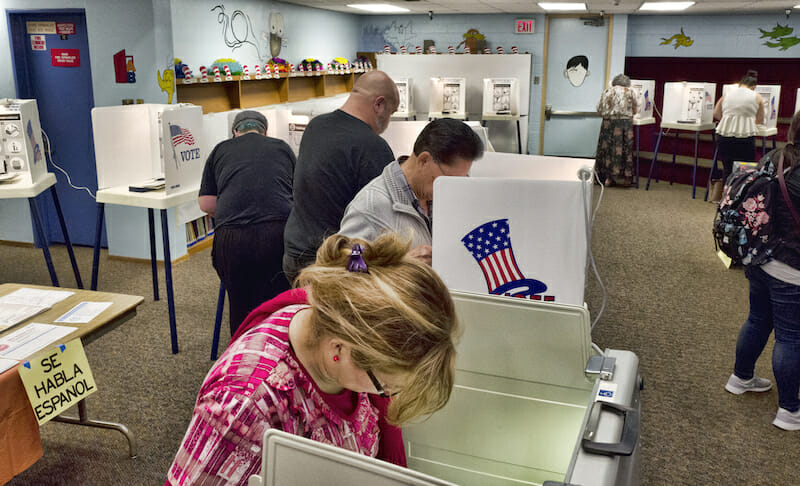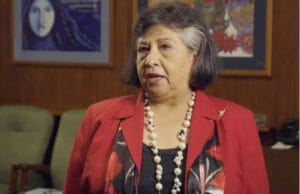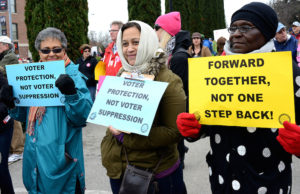America’s Future Depends on California’s Election Integrity
Despite efforts to make the state’s voting system sound, there are pressing problems, which, should they persist, will have a disastrous impact on the state and the nation. Voters mark their ballots at a polling place in the Robert F. Kennedy Elementary School in Los Angeles in June. (Richard Vogel / AP)
Voters mark their ballots at a polling place in the Robert F. Kennedy Elementary School in Los Angeles in June. (Richard Vogel / AP)
California is in the news as “ground zero” for the coming struggle over the federal balance of power in November 2018. So opines Larry Hart, a senior fellow at the American Conservative Union Foundation, in a piece published earlier this summer in The Hill.
A year ago, this might have been good news. California restored mandatory paper ballot voting systems over a decade ago, when then-Secretary of State Debra Bowen implemented a security review of the election software used in all of California’s voting systems. It was found vulnerable to tampering and glitches, so paper was instituted as the ballot of record.
California already had a mandatory audit of results obtained by software counting paper: 100 percent of the ballots in at least 1 percent of each county’s precincts, chosen by random selection, had to be hand-counted. The hand-count had to prove that the scanned results were accurate, or else further steps had to be taken. All in all, California scored fairly well in terms of its election integrity, compared with states like Georgia, still reliant on 100 percent paperless touchscreen voting machines and no audits.
But last year, the California Legislature passed a bill, AB 840, that screwed things up. The bill was purportedly designed to enable registrars to contact voters who’d failed to put their signature on the outside of their returned mail ballots; voters thus contacted could come in, sign, and have their vote counted instead of discarded. However, as the bill progressed from the state Assembly and through the state Senate toward passage, it acquired a stealth amendment.
Few legislators knew the amendment existed, let alone its implications, but it was a lethal blow to honest elections. For the sake of efficiency, CACEO—the California Association of Clerks and Election Officials—requested that the exponentially growing amounts of late-arriving ballots, both mail and provisional (ballots used to record a vote when there are questions about a given voter’s eligibility), be exempted from the mandatory audit.
Their wish was granted. California’s late ballot batches will be counted on software, and the results will go unverified by any check or balance.
Mail balloting has exploded in California. Recent legislation allows counties to send every voter a mail ballot if they choose. Any county can also turn whole precincts into vote-by-mail-only and close the precinct polling places. Voters are often notified by a single piece of mail. They may remain unaware and, on Election Day, try to vote at any open polling place they can find.
If they are unaware of the rule of having to “surrender” their unused mailed ballot to vote at the polls, they must vote provisionally. So, the expansion of vote-by-mail has also meant an increase in provisional voting. CACEO argued that it took too long to process all these ballots out of their signed envelopes, so they can’t be scanned with the precinct results that are randomly selected and hand-audited to check the machines. So, AB 840 restricts the audit pool to the “semi-official canvass results”—i.e., ballots counted on election night: at-polls regular ballots and mail ballots that arrived before Election Day, so they could be signature-checked and separated from their envelopes for inclusion in the precinct scan.
In short, an increasingly large and very specific portion of California votes—the late-processed ballots—are counted on computer with no verification of accuracy. Our polarized politics make battlefields of elections. And those battles are increasingly decided late in the day, on absentees and provisionals—as in the ongoing Ohio special congressional election count; as in Georgia’s special congressional election in 2017; as in the balance-of-power Virginia statehouse election in 2017 that was ultimately decided by a coin toss. None of these squeakers was entirely verified.
Exploitation is possible and even probable. We are being warned by cybersecurity experts that all the lights are flashing on our voting systems, and that they’ve already suffered intrusion with unknown impact. Exempting California’s ballots from verification by audit is beyond irresponsible. It is enabling crime. We are accessories when we leave the door unlocked.
Los Angeles County suffered a “printing error” in June 2018 that dropped 118,000 eligible voters from its precinct rolls. This single error, attributed to incompatible software transfers, swelled the late-ballot batch by 92,000 provisionals. Registrar Dean Logan assured the public that he’d flagged the affected voters and counted all their ballots. Under pressure, he also announced that he would audit the results. This was the right thing to do, but how that audit was performed has not yet been made public. Whatever the method, the public should know. And it should serve as the template for all counties to audit their late-counted ballots—not just provisionals, but late-arriving mail ballots, too. California’s results cannot go unverified this year.
Secretary of State Alex Padilla has latitude in issuing rules and procedures for conduct of elections. CACEO and our legislature must be accountable for what they’ve done, and there must be an emergency regulation to audit the late-ballot count, at minimum, to the same 1 percent random-selection standard as the semi-final official canvass. Conditions are ripe to make a surprise outcome credible. Whether it’s real or merely seems real can only be determined by verifying all computer ballot counts, as was Californians’ intent when we established the mandatory hand-audit. Without it, mistakes will go undetected. Manipulation will go undeterred.
Larry Hart ended his article in The Hill by noting that we may be “up late” to watch the nation’s fate decided in California. We may be up later than that if it takes days to tally the late-ballot counts. And if those counts happen on computers with no hand-count check or balance, California will be implicated in exacerbating the doubts, polarizing anger, and uncivil attacks that are ruining our democracy.
Your support matters…Independent journalism is under threat and overshadowed by heavily funded mainstream media.
You can help level the playing field. Become a member.
Your tax-deductible contribution keeps us digging beneath the headlines to give you thought-provoking, investigative reporting and analysis that unearths what's really happening- without compromise.
Give today to support our courageous, independent journalists.







You need to be a supporter to comment.
There are currently no responses to this article.
Be the first to respond.